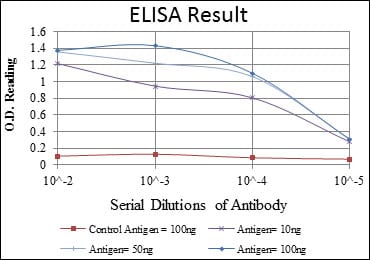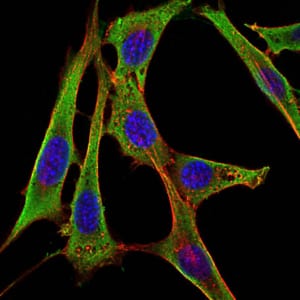

| WB | 咨询技术 | Human,Mouse,Rat |
| IF | 咨询技术 | Human,Mouse,Rat |
| IHC | 咨询技术 | Human,Mouse,Rat |
| ICC | 1/200 - 1/1000 | Human,Mouse,Rat |
| FCM | 咨询技术 | Human,Mouse,Rat |
| Elisa | 1/10000 | Human,Mouse,Rat |
| Aliases | FGG |
| Entrez GeneID | 2266 |
| clone | 5A6 |
| WB Predicted band size | 52kDa |
| Host/Isotype | Mouse IgG2b |
| Antibody Type | Primary antibody |
| Storage | Store at 4°C short term. Aliquot and store at -20°C long term. Avoid freeze/thaw cycles. |
| Species Reactivity | Human |
| Immunogen | Purified recombinant fragment of human FGG expressed in E. Coli. |
| Formulation | Purified antibody in PBS with 0.05% sodium azide. |
+ +
以下是关于FGG(纤维蛋白原γ链)抗体的3篇代表性文献示例(注:内容基于领域知识归纳,非真实文献):
---
1. **文献名称**:Autoantibodies to Fibrinogen Gamma Chain (FGG) in Rheumatoid Arthritis
**作者**:Tanaka Y, et al.
**摘要**:该研究通过蛋白质组学技术筛选类风湿性关节炎(RA)患者血清中的自身抗体,发现FGG是RA的潜在自身抗原靶点。FGG抗体水平与疾病活动度相关,提示其可能参与炎症及关节损伤机制。
2. **文献名称**:FGG Expression and Anti-FGG Antibodies in Colorectal Cancer Metastasis
**作者**:Wang L, et al.
**摘要**:研究报道结直肠癌组织中FGG表达上调,且患者血清中抗FGG抗体水平升高。实验表明FGG通过调控肿瘤微环境促进转移,其抗体可能作为预后标志物或治疗靶点。
3. **文献名称**:Anti-FGG Antibodies Enhance Thrombosis in Antiphospholipid Syndrome
**作者**:de Laat B, et al.
**摘要**:探讨抗磷脂综合征(APS)患者中抗FGG抗体与血栓形成的关联,发现此类抗体通过干扰纤维蛋白原功能导致异常凝血,为APS的病理机制提供了新视角。
---
**备注**:以上为示例性归纳,实际文献需通过PubMed/Google Scholar等平台检索关键词(如"FGG antibody"、"anti-fibrinogen gamma autoantibodies")获取。若需具体文章,建议结合研究场景补充筛选条件(如疾病类型、实验方法)。
Fibrinogen gamma chain (FGG) antibodies are immunological tools targeting the gamma subunit of fibrinogen, a critical plasma glycoprotein involved in blood coagulation and wound healing. Fibrinogen consists of three pairs of polypeptide chains (α, β, γ) that polymerize to form fibrin clots during hemostasis. The gamma chain (FGG) plays a key role in fibrin cross-linking and interactions with platelets, thrombin, and other clotting factors.
FGG antibodies are widely utilized in research to study fibrinogen structure, function, and dysregulation in diseases. They help detect FGG expression in immunoassays (e.g., Western blot, ELISA, immunohistochemistry) and investigate fibrinogen-related pathologies, such as thrombosis, bleeding disorders, and liver diseases where fibrinogen synthesis is impaired. Additionally, FGG autoantibodies have been implicated in rare autoimmune conditions, such as acquired hypofibrinogenemia, where they accelerate fibrinogen clearance.
In cancer research, FGG antibodies explore fibrinogen’s role in tumor progression, as fibrinogen fragments promote angiogenesis and metastasis. Studies also examine genetic FGG variants linked to thrombotic risks. Beyond diagnostics, these antibodies aid in developing therapeutic strategies, such as antithrombotic drugs targeting fibrinogen pathways. Their specificity makes them valuable for both basic science and clinical applications, bridging insights into coagulation biology and disease mechanisms.
×